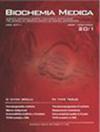Subfatin concentration decreases in acute coronary syndrome
IF 1.8
3区 医学
Q1 MEDICAL LABORATORY TECHNOLOGY
引用次数: 2
Abstract
Introduction We investigated the association of serum subfatin concentration and acute myocardial infarction (AMI) in patients with ST-elevation myocardial infarction (STEMI) and non-STEMI (NSTEMI). Materials and methods In this study, patients who presented with chest pain (STEMI, NSTEMI, or non-cardiac chest pain) were included, i.e. 49 patients with non-cardiac chest pain (control) and 66 patients hospitalised with AMI. In the AMI group, 35 patients had NSTEMI and 31 had STEMI. Serum subfatin concentrations were determined via enzyme-linked immunosorbent assay (ELISA). Descriptive data on the patients and their comorbidities were recorded, and subfatin concentrations were analysed. Results Subfatin concentrations were significantly different in the control, STEMI and NSTEMI groups (P = 0.002). In addition, subfatin concentrations were significantly lower in patients in the NSTEMI group than those in the control group (P < 0.001), but there was no significant difference between STEMI and the control group (P = 0.143). The receiver operating characteristic (ROC) analysis performed for differentiating the AMI and control groups found that subfatin had 64% sensitivity and 69% specificity, whereas troponin had 59% sensitivity and 95% specificity. In patients with AMI, the ROC analysis for differentiating NSTEMI from STEMI found that subfatin had 94% sensitivity and 41% specificity, while troponin had 65% sensitivity and 88% specificity. Conclusions Subfatin concentrations were lower in patients without STEMI than in patients with STEMI. Subfatin concentration is associated with NSTEMI.急性冠状动脉综合征亚脂蛋白浓度降低
引言我们研究了ST段抬高型心肌梗死(STEMI)和非STEMI(NSTEMI)患者血清亚锡浓度与急性心肌梗死(AMI)的关系。材料和方法在本研究中,包括出现胸痛(STEMI、NSTEMI或非心脏性胸痛)的患者,即49名非心脏性胸部疼痛患者(对照组)和66名AMI住院患者。在AMI组中,35名患者患有NSTEMI,31名患者患有STEMI。血清亚锡浓度通过酶联免疫吸附试验(ELISA)测定。记录患者及其合并症的描述性数据,并分析亚锡浓度。结果对照组、STEMI组和NSTEMI组亚脂蛋白浓度差异有统计学意义(P=0.002)。此外,NSTEMI组患者亚脂蛋白的浓度显著低于对照组(P<0.001),但STEMI和对照组之间没有显著差异(P=0.143)。用于区分AMI和对照组的受试者操作特征(ROC)分析发现亚锡具有64%的敏感性和69%的特异性,而肌钙蛋白具有59%的敏感性和95%的特异性。在AMI患者中,区分NSTEMI和STEMI的ROC分析发现亚锡具有94%的敏感性和41%的特异性,而肌钙蛋白具有65%的敏感性和88%的特异性。结论非STEMI患者的亚脂蛋白浓度低于STEMI患者。亚脂蛋白浓度与NSTEMI有关。
本文章由计算机程序翻译,如有差异,请以英文原文为准。
求助全文
约1分钟内获得全文
求助全文
来源期刊

Biochemia Medica
医学-医学实验技术
CiteScore
5.50
自引率
3.00%
发文量
70
审稿时长
>12 weeks
期刊介绍:
Biochemia Medica is the official peer-reviewed journal of the Croatian Society of Medical Biochemistry and Laboratory Medicine. Journal provides a wide coverage of research in all aspects of clinical chemistry and laboratory medicine. Following categories fit into the scope of the Journal: general clinical chemistry, haematology and haemostasis, molecular diagnostics and endocrinology. Development, validation and verification of analytical techniques and methods applicable to clinical chemistry and laboratory medicine are welcome as well as studies dealing with laboratory organization, automation and quality control. Journal publishes on a regular basis educative preanalytical case reports (Preanalytical mysteries), articles dealing with applied biostatistics (Lessons in biostatistics) and research integrity (Research integrity corner).
 求助内容:
求助内容: 应助结果提醒方式:
应助结果提醒方式:


